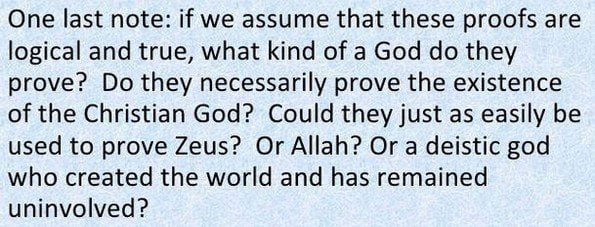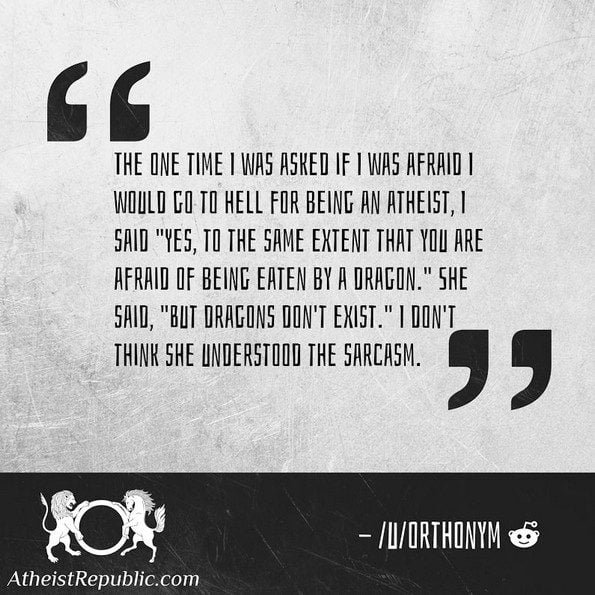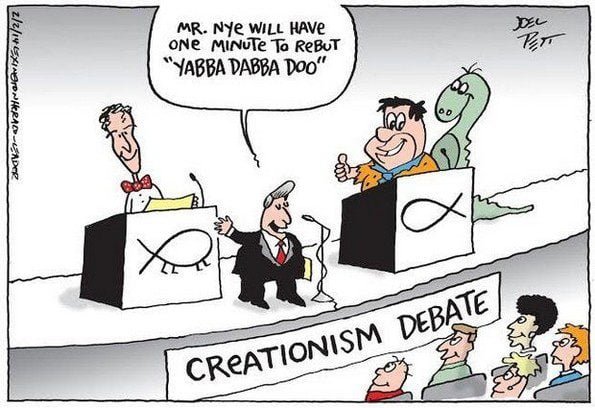
Stacy Long, a writer for the American Family Association, admits that when taking the Bible at face value, the Christian God comes off looking more like a murderous psychopath than the loving, doting father Evangelicals say he is. Long writes:
Often we read the Bible and have a hard time making the connection between God’s role in the Old and New Testaments. How do we reconcile Jesus’ teachings of God’s love and longsuffering, of kindness to our fellow man, of redemption and sacrifice for all people with the Old Testament instruction to pillage and conquer the Canaanites with instant death for one who so much as laid a careful hand on the Ark of the Covenant with stoning an entire family because one man went astray.
The Christian God’s optics problem is one of the reasons often given for people leaving Christianity. If the Bible is taken at face value (literally), especially the Old Testament, God is a vindictive, petty, petulant, narcissistic son-of-a-bitch deity who doesn’t deserve one second of obeisance and worship. From the Father God perspective, the Christian God is a father who neglects his children, refuses to meet their basic needs, and physically abuses them when they fail to meet his exacting, perfectionist standard of living.
Even in the New Testament God has an optics problem. What kind of father allows his son to be brutally tortured for the crimes of others? While the Christian God certainly is viewed in a better light in much of the New Testament, he returns to his Old Testament self in the book of Revelation, a 22-chapter story of God’s slaughter of the human race and the destruction of earth. Perhaps God suffers from multiple personality disorder or is schizophrenic. Perhaps from Matthew to Jude God is well-medicated and refrains from returning to his murderous ways. In Revelation, tired of the calming effects of anti-psychotic medications, God goes off his meds and makes up for lost time by slaughtering billions of people.
While Long recognizes that God has an optics problem, she attempts to rehabilitate God’s psychopathic resume by suggesting that God operates according to a different moral and ethical standards than sinful humans. Long writes:
And so, God’s ways are not our ways. But even when His ways seem strange to us – unlike what we know of Him – His ways are still the same, and He is still good.
….
So, maybe it is not so much that God’s actions are inscrutable, as our understanding of them is precarious. Not that we lack some secret key to biblical exposition, but simply because we are not God. He’s looking at the picture from a whole different angle, and what He sees may be very different from what we see. What He knows and understands may be completely unknown to us. In short, what we may misunderstand and call bad, He may call good.
Over the years, as I have attempted to challenge Evangelical beliefs by pointing out God’s immoral behavior, Christians have reminded me that it is impossible for us to judge God using human reasoning. According to Evangelicals, God’s ways are not our ways. Where do they get such a notion? Right out of the Bible:
For my thoughts are not your thoughts, neither are your ways my ways, saith the Lord. For as the heavens are higher than the earth, so are my ways higher than your ways, and my thoughts than your thoughts. (Isaiah 55:8,9)
According to Evangelicals, God’s behavior can never be questioned because his ways are beyond human reason and understanding. In other words, God can do whatever the hell the wants because he is God. The Apostle Paul, when questioned about God choosing to save some people but not others, wrote:
For the scripture saith unto Pharaoh, Even for this same purpose have I raised thee up, that I might shew my power in thee, and that my name might be declared throughout all the earth. Therefore hath he mercy on whom he will have mercy, and whom he will he hardeneth. Thou wilt say then unto me, Why doth he yet find fault? For who hath resisted his will? Nay but, O man, who art thou that repliest against God? Shall the thing formed say to him that formed it, Why hast thou made me thus? Hath not the potter power over the clay, of the same lump to make one vessel unto honour, and another unto dishonour? (Romans 9:17-21)
Simply put, Paul is saying, Shut up! How dare you question God! God is God and he can do whatever he wants to do.
Long concludes her defense of the Christian God’s immoral behavior with the Biblical story of Mary, Joseph, and Jesus:
Take the birth of Jesus for instance. Looking at the story from a human viewpoint, it is a completely tragic affair. A girl gets pregnant out of wedlock, her fiancée is compelled to marry her against his own inclination, they are forced into an arduous journey through unfriendly terrain, they are destitute and homeless when it comes to the time for childbirth, and the whole thing ends with a lot of innocent infants being massacred and Jesus’ parents having to flee for their lives to a foreign land not knowing if they will see their home and families again. For a sad tale of a couple who really get their lives messed up, that beats Romeo and Juliet hollow. Oh, and then that baby who came into the world through so much trouble and pain ends up being horrifically executed as a criminal and denied by His closest friends. And yet, from our retrospective understanding of God’s purpose, we celebrate His birth as the sweetest, most joyous event of all time.
Long, as every Evangelical, reads the Bible selectively. When Evangelicals read the story of the conception and birth of Jesus, all they see is the wonderful babe in the manger — God incarnate who came to earth to save sinners. While rose-colored-glasses wearing Evangelicals know that there are morally perplexing and contradictory aspects of the incarnation story, they shut their minds off from reason, believing instead that their God would never do anything that was not for their good.
So then, God raping a virgin teenage girl and making her the surrogate for Jesus is okay because these heinous behaviors led to the birth of Jesus, the savior of the world. Is this not why many Evangelicals believe that there should be no abortion exceptions? According to Evangelicals, if a woman is violently raped and impregnated by a psychopath, she still should be forced to carry the fetus to term. Why? Well, look at how things worked out for Mary. She carried her fetus to term and that fetus became a miracle-working prophet, a God-man hybrid, who was violently tortured and executed so his blood could be used to wash away our sins. Amazing and wonderful, right?
God, who is all-knowing and all-powerful, could have chosen to impregnate Mary another way (by having Joseph impregnate her and then supernaturally turning the fetus into Jesus, the son of God). In fact, he could have provided a different method of salvation. But, he didn’t. Evangelicals often focus on the heathen ruler who massacred all the male babies in Bethlehem and the surrounding area under the age of two. What an awful, murderous man, Evangelicals say. Wait a minute, couldn’t God have stopped Herod’s slaughter? Shouldn’t God, who is the creator of the universe and the divine human puppet master, be held accountable for what happens on his watch?
Evangelicals argue that God cannot do wrong, and that he is morally pure. When confronted with Bible stories that suggest otherwise, Christians rush in to defend their God from charges of immorality. I get it–the Christian narrative must be protected at all costs. If God is shown to be culpable for his behavior, why that would mean that he is not a deity worthy of human fealty, fidelity, devotion, and worship. And this is exactly what Evangelicals-turned-atheists such as I believe. Even if the Evangelical God exists, and he doesn’t, he would not be a deity worthy of our devotion and worship. We refuse to bow in worship to a God who has spent the last 6,020 years murderously working its way through human history. We refuse to bow in worship to a God who considers sickness, disease, starvation and war “good.” We refuse to bow in worship to a God who had stood on the sidelines of human history doing nothing as blood flows in the world’s streets.
I know all the excuses Evangelicals give for their God’s behavior. I used them myself in sermon after sermon, and they were little more than defenses of the indefensible. God has the power necessary to radically change life on earth, yet he does nothing. Outside of helping Granny Louise find her car keys and helping Tim Tebow keep his virginity, God is largely AWOL. When will Christians realize that their God is not who they claim he is? Anyone with a modicum of reason and basic observation skills can conclude that the God being peddled by Evangelicals is a work of fiction.
Evangelicals are forced to ignore or reinterpret vast portions of the Bible in order to main the Christian narrative: that God is a kind, loving, long-suffering deity who desires to save people from their sins, that he is a God personally involved in the affairs of the human race, right down to giving each of us the breath to breathe. I ask, dear Christians, where is this God of yours? Outside of your minds, where can I find this God? Better yet, based on what I read in the Bible, why should I devotedly worship the Christian God? What is there about your God that deems him worthy of my love and devotion? From my seat in the atheist pew, if I knew of someone who behaved in a fashion similar to the Christian God, I would advocate for his immediate incarceration and execution. Such a loathsome creature does not deserve life. In every way, the Christian God is worse than the most vile of humans. Why would I ever want to worship such a God?
Simple, Bruce, if you don’t, God will torture you in hell for eternity after you die.
Thank you for making my point.
Share This Post On Social Media:











